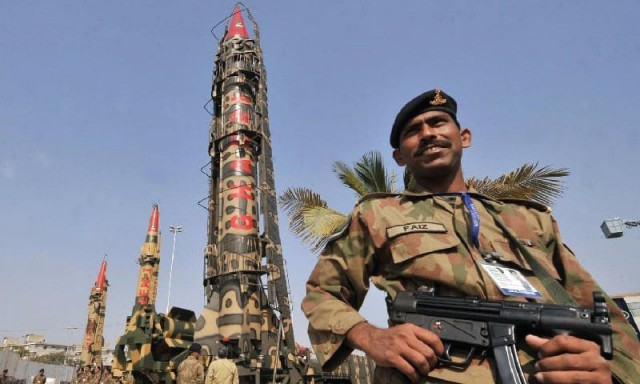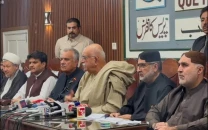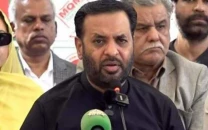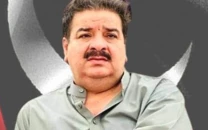Full-spectrum deterrence? Envoy rejects West’s concern
Says tactical N-weapons have been centre of dialogue with US.

PHOTO: AFP
This was stated by Pakistan’s former representative to International Atomic Energy Agency and Conference on Disarmament Zamir Akram.
He was delivering a lecture on ‘Politics of Nuclear Non-Proliferation, NSG and Way forward for Pakistan’ at the Islamabad-based think-tank Strategic Vision Institute (SVI) on Friday.
Tactical or short range nuclear weapons have been at the centre of the dialogue with the United States over strategic issues.
US Special Envoy for Afghanistan and Pakistan Richard Olson this week told a Congressional Panel that Washington was holding ‘candid discussions’ with Islamabad on its tactical weapons.

Akram said pressure was being exerted on Pakistan to cap its nuclear and missile programme.
“We should categorically tell the western countries that we cannot cap our strategic programme,” he advised.
He further rejected Western concerns about Full-Spectrum Deterrence saying it can be achieved at the minimum level and there was no contradiction between the two concepts.
He was of the opinion that after India adopted ‘Cold Start Doctrine’, Pakistan was left with the choice of either matching India’s defense expenditure or opting for the cost-effective tactical weapons.
“This (strategy of developing short range missiles) has worked for Pakistan,” he maintained.
The former envoy said that the West has been particularly biased against the Pakistani programme.
Meanwhile, Indians, he said, were being given a free hand to expand both conventional and nuclear capabilities. India, he opined, was a beneficiary of dynamics of international strategic environment where US wants to promote it as a counter to China’s rise as a global power.
About the significance of getting NSG’s membership, he said, “it was a measure of one’s status as nuclear power.”
Pakistan, he suggested, can counter Western pressure on its nuclear programme by leveraging its strategic importance for the West in the context of its counter-terrorism efforts.
President SVI Dr Zafar Iqbal Cheema said it was absurd to ask Pakistan to revert from full-spectrum deterrence to strategic deterrence and unilaterally sign the CTBT that the US itself has not ratified.
Published in The Express Tribune, December 19th, 2015.



















COMMENTS
Comments are moderated and generally will be posted if they are on-topic and not abusive.
For more information, please see our Comments FAQ